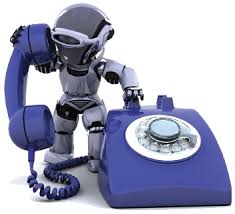Once again, I find myself issuing a disclaimer at the outset of a post. I’m an unabashed fan of leveraging technology as much as possible. I sit on the boards or advisory boards of several companies that have great technology solutions for business professionals.
However, too often, our automation efforts have the unintended effect of making us worse, dumbing us down.
My latest rampage started a couple of days ago. Hank Barnes and I were discussing an idea he had about improving insight delivery and sales performance in the discovery process. He ended up writing a terrific post: “Next” Practice For Building Customer Interest And Trust.
But my discussion with Hank was around what I see happening too often. Some well intended sales enablement professional will take this idea, automating it. I can see it now, as a sales person “completes” the call in the CRM system, a “bot” automatically schedules an email with “insight” for the customer. The sales person doesn’t have to do a thing–they are freed up to make the next call on their list, with the system supporting them with insights they never see.
Too often, our attempts to automate, improving the efficiency of our sales people, actually has the impact of dis-engaging the sales person, dumbing them down. We loose sight of the fact that doing it themselves has tremendous value. We lose sight of what the sales person learns in the process of finding the insight themselves. We lose the advantage of what they learn in presenting it to the customer, positioning it in the context of the conversation–deepening the relationship and enabling them to create more value.
Selling, creating value with the customer, is a “thinking person’s” profession, at least when we look at complex B2B buying processes.
Too often, rather than providing our people with the tools to help them figure things out, to help them effectively engage customers in deep conversations with customers we do the opposite. As a result, their ability to engage, teach, understand, empathize, and lead their customers is diminished. We put greater distance between the customer and the sales person. It diminishes our impact and effectiveness.
This is what too many get wrong about automation. We have to first improve the ability of our people to be effective–that is to engage the customer in deep conversations, to think critically, to teach, guide and control. Only when our people have mastered these, then we should focus on improving their efficiency in executing these things.
Instead, we focus on efficiency, enabling them to “accomplish” more in less time.
We are investing billions in providing automation, content, and other tools to improve the efficiency of sales people. Yet, the results produced by sales people continue to decline.
Perhaps we are automating the wrong thing. Perhaps in the spirit of being helpful, we are actually not helping our sales people improve.
Perhaps we should focus on helping our sales people get better—automation is not always (or even usually) the answer to this challenge.

Leave a Reply